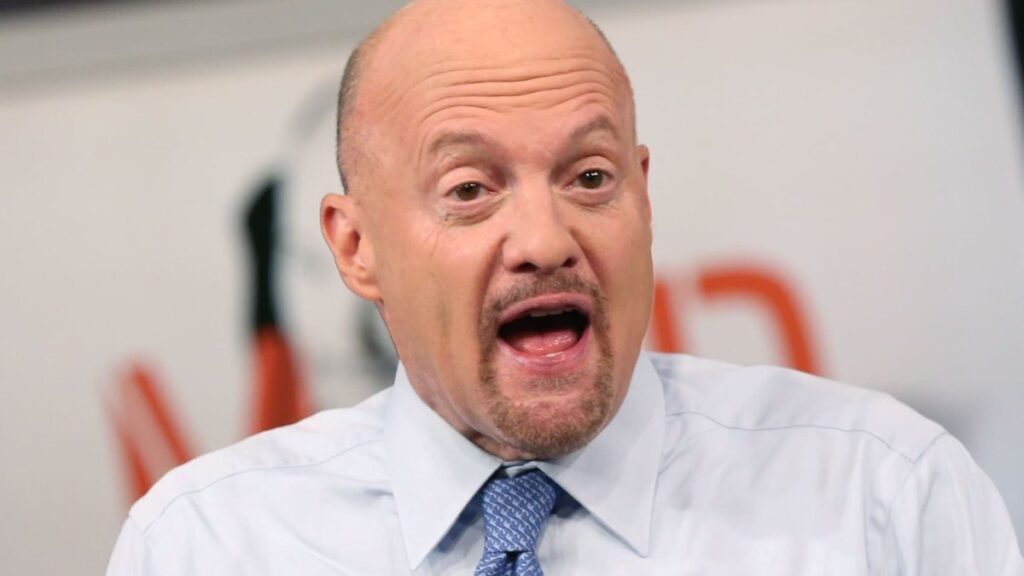In the ever-fluctuating world of stock market investments, finding reliable advice can be a challenge. However, CNBC’s Jim Cramer, known for his bold statements and market insights, has recently reiterated a piece of wisdom that could prove valuable for both novice and experienced investors alike. Cramer’s message is clear: don’t get caught up in the day-to-day noise of Wall Street downgrades and trading activities. Instead, he advocates for a more steadfast approach, encouraging investors to stick with solid companies, even when their share prices experience temporary fluctuations.

The Pitfalls of Following Downgrades
Cramer’s advice comes at a time when the market has been experiencing a series of downgrades, particularly affecting some of the most prominent companies in the tech sector. He points out the potential danger in blindly following these downgrades, stating:
“When I look at the history of this incredible bull market—and it has been an incredible bull market—it’s littered with ‘buy-to-hold, hold-to-sell, buy-to-hold, hold-to-sell,’ these downgrades that scare you out of amazing stocks at levels that may temporarily be too high, but will recover later. If you listen to the downgrades, though, you’ll never recover with it.”
This statement encapsulates Cramer’s philosophy on long-term investing. He argues that the constant cycle of upgrades and downgrades can lead investors to make hasty decisions, potentially missing out on significant long-term gains. By focusing too much on these short-term fluctuations and analyst opinions, investors might be scared out of positions in fundamentally strong companies, only to watch from the sidelines as these stocks recover and continue to grow.
A “Ridiculous Plethora” of Downgrades
Cramer’s comments were particularly timely, coming on the heels of what he described as a “ridiculous plethora of sell-side downgrades” that occurred on a Monday. This wave of downgrades coincided with a notable dip in major market indices:
- The Dow Jones Industrial Average fell by 0.94%
- The S&P 500 declined by 0.96%
- The Nasdaq Composite dropped by 1.18%
While Cramer acknowledged that the session was indeed poor, he emphasized that allowing such short-term market movements and analyst downgrades to dictate investment decisions can be detrimental, especially for those with a long-term investment horizon. This perspective highlights the importance of maintaining a broader, more strategic view of one’s investments, rather than being swayed by day-to-day market fluctuations.
Case Study: Amazon
To illustrate his point, Cramer discussed the recent downgrade of Amazon by Wells Fargo. Despite acknowledging that the e-commerce and cloud computing giant is facing some challenges, Cramer disagreed with the downgrade. His reasoning was based on Amazon’s track record of resilience and its ability to overcome obstacles in the past.
Cramer pointed out that Amazon has a history of bouncing back from setbacks, suggesting that it’s only a matter of time before the company does so again. He referenced a specific example to support his argument: the substantial dip in Amazon’s stock price at the beginning of August, following a revenue miss in the company’s quarterly report. Despite this initial setback, the shares managed to recover, demonstrating the company’s underlying strength and the market’s enduring faith in its business model.
This example serves to reinforce Cramer’s overall message about the importance of looking beyond short-term fluctuations and analyst downgrades. It suggests that for companies with strong fundamentals and a proven track record of success, temporary setbacks should not necessarily be seen as indicators of long-term decline.
Case Study: Apple
Another example Cramer used to support his argument was the recent downgrade of Apple by Jefferies. Once again, Cramer expressed disagreement with the downgrade, even while acknowledging that Apple might be facing some near-term challenges, particularly with the upcoming release of the iPhone 16.
Cramer’s defense of Apple was rooted in the company’s long-standing reputation for excellence and innovation. He argued that Apple doesn’t have a history of releasing subpar products, implying that betting against the company based on speculation about a future product release might be short-sighted. In Cramer’s words, the downgrade was essentially “betting against Apple’s entire culture of excellence.
This perspective highlights an important aspect of Cramer’s investment philosophy: the value of considering a company’s culture, track record, and overall market position when making investment decisions. It suggests that for companies like Apple, which have consistently demonstrated their ability to innovate and maintain market leadership, short-term concerns should be weighed against the company’s long-term potential and historical performance.
The Dangers of Excessive Trading
Beyond his specific comments on individual stocks and downgrades, Cramer also offered a broader critique of Wall Street’s approach to investing. He stated bluntly, “Wall Street is addicted to trading.” This observation speaks to the culture of frequent buying and selling that often characterizes professional trading floors and can sometimes influence individual investors.
Cramer’s advice for individual investors is clear:
“But if you’re managing your own money, you should not be listening to all of this trading advice. You can’t afford to do what they want you to do because trading is a full-time job.”
This statement underscores a crucial distinction between professional traders and individual investors. While professional traders have the time, resources, and often the technological tools to engage in frequent trading, most individual investors are not in a position to do so effectively. Attempting to mimic the rapid-fire trading strategies of Wall Street professionals can be not only time-consuming but potentially harmful to an individual’s investment portfolio.
Instead, Cramer’s advice implies that individual investors should focus on a more sustainable, long-term approach to investing. This might involve:
- Identifying fundamentally strong companies
- Investing in these companies with a long-term perspective
- Avoiding the temptation to react to every market fluctuation or analyst downgrade
- Focusing on the underlying business performance rather than short-term stock price movements
By adopting this approach, individual investors can potentially avoid the pitfalls of excessive trading, such as transaction costs, tax implications, and the risk of making emotional decisions based on short-term market movements.
The Broader Context: Bull Market Resilience
It’s important to consider Cramer’s advice within the broader context of the current market environment. He refers to the present market as an “incredible bull market,” suggesting that despite periodic downturns and fluctuations, the overall trend has been positive for an extended period.
This characterization of the market provides additional context for Cramer’s advice about ignoring downgrades and sticking with solid companies. In a bull market, there’s often a general upward trend in stock prices over time, even if there are short-term dips or periods of volatility. By maintaining positions in strong companies through these fluctuations, investors may be better positioned to benefit from the overall upward trajectory of the market.
However, it’s crucial to note that past performance does not guarantee future results, and even in a bull market, there are risks associated with any investment. Cramer’s advice should be considered as one perspective among many, and investors should always conduct their own research and consider their individual financial situations and risk tolerance before making investment decisions.
Conclusion: A Call for Patient, Informed Investing
Jim Cramer’s recent comments serve as a reminder of the importance of patience and perspective in investing. By advocating for a focus on solid companies and warning against the perils of reacting to every downgrade or market fluctuation, Cramer is essentially calling for a more measured, long-term approach to investing.
This advice is particularly relevant in today’s fast-paced, information-saturated market environment. With 24/7 financial news coverage, a constant stream of analyst reports, and the ability to trade stocks with just a few clicks, it can be tempting for individual investors to adopt a more active, trading-oriented approach. However, Cramer’s wisdom suggests that for most individual investors, a more patient, informed strategy focused on quality companies may be more appropriate and potentially more rewarding in the long run.
Ultimately, while it’s important to stay informed about market trends and company performance, Cramer’s message emphasizes the value of developing a solid investment strategy and sticking to it, rather than being swayed by every piece of news or analyst opinion. By maintaining this disciplined approach, investors may be better positioned to navigate the ups and downs of the market and potentially achieve their long-term financial goals.










Add Comment